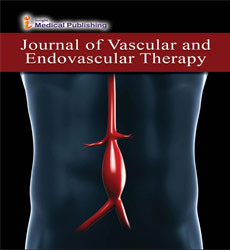Impact of Diabetes on the Vascular System and its Implications
Yuki Saito
Department of Vascular Surgery, Stanford University, Stanford, California, USA
Published Date: 2024-08-15DOI10.36648/2634-7156.9.4.208
Yuki Saito*
Department of Vascular Surgery, Stanford University, Stanford, California, USA
- *Corresponding Author:
- Yuki Saito
Department of Vascular Surgery, Stanford University, Stanford, California,
USA,
E-mail: saitoyuki@gmail.com
Received date: July 15, 2024, Manuscript No. IPJVES-24-19702; Editor assigned date: July 18, 2024, PreQC No. IPJVES-24-19702 (PQ); Reviewed date: August 01, 2024, QC No. IPJVES-24-19702; Revised date: August 08, 2024, Manuscript No. IPJVES-24-19702 (R); Published date: August 15, 2024, DOI: 10.36648/2634-7156.9.4.208
Citation: Saito Y (2024) Impact of Diabetes on the Vascular System and its Implications. J Vasc Endovasc Therapy Vol.9 No.4: 208.
Description
Diabetes is a chronic metabolic disorder characterized by elevated blood glucose levels due to insulin dysfunction. Over time, diabetes can have significant repercussions on the vascular system, leading to a range of complications that affect blood vessels and overall cardiovascular health. Understanding the relationship between diabetes and the vascular system is vital for recognizing the potential long-term effects and the importance of maintaining vascular integrity. The vascular system is a complex network composed of arteries, veins and capillaries that transports blood throughout the body. Arteries carry oxygen-rich blood away from the heart to the tissues, while veins return deoxygenated blood back to the heart. Capillaries, the smallest blood vessels, facilitate the exchange of oxygen, nutrients and waste products at the cellular level. A well-functioning vascular system is essential for sustaining life and maintaining homeostasis. Diabetes can lead to various vascular complications through mechanisms that directly impact blood vessels. The primary issues associated with diabetes include endothelial dysfunction, atherosclerosis and microvascular damage.
The endothelium is a thin layer of cells that lines blood vessels and plays a vital role in maintaining vascular health. In individuals with diabetes, high blood glucose levels can cause damage to the endothelial cells, leading to a condition known as endothelial dysfunction. This dysfunction impairs the ability of blood vessels to dilate and regulate blood flow effectively. When endothelial function is compromised, it can result in increased vascular permeability and an inflammatory response. This inflammatory environment attracts immune cells, which can contribute to further damage and promote the development of atherosclerosis.
Diabetes significantly accelerates the process of atherosclerosis, a condition characterized by the buildup of plaques within the arterial walls. The presence of high levels of low-density lipoprotein cholesterol, combined with the inflammatory state induced by diabetes, promotes the formation of plaques that narrow and stiffen the arteries. As plaques grow, they restrict blood flow to vital organs, increasing the risk of serious cardiovascular events. This can lead to complications such as coronary artery disease, peripheral artery disease and cerebrovascular disease, all of which are significant concerns for individuals with diabetes.
In addition to macro vascular complications (which affect larger blood vessels), diabetes can also lead to microvascular damage, which impacts smaller blood vessels. This damage is particularly evident in conditions such as diabetic retinopathy, nephropathy and neuropathy. High blood sugar levels can cause damage to the tiny blood vessels in the retina, leading to vision problems and in severe cases, blindness. The kidneys contain many small blood vessels and prolonged high glucose levels can damage these vessels, impairing kidney function and potentially leading to kidney failure. The nerves throughout the body can also be affected by diabetes. Damage to the small blood vessels that supply these nerves can lead to neuropathy, causing pain, tingling and loss of sensation.
Several risk factors can exacerbate the impact of diabetes on the vascular system. These include lifestyle choices, comorbid conditions and genetic predispositions. Conditions such as hypertension and dyslipidemia are common in individuals with diabetes and further increase the risk of vascular complications. High blood pressure can exacerbate endothelial dysfunction, while abnormal lipid profiles can accelerate atherosclerosis. A family history of diabetes or cardiovascular disease can predispose individuals to vascular complications. Genetic factors may influence how the body metabolizes glucose and responds to insulin, impacting vascular health.
Preventive measures
While the content does not address into specific treatments, it is essential to emphasize the importance of preventive measures and lifestyle modifications to mitigate the impact of diabetes on the vascular system. Engaging in physical activity can improve insulin sensitivity, aid in weight management and enhance overall cardiovascular health. Aim for at least 150 mins of moderate aerobic activity each week. A diet rich in fruits, vegetables, whole grains, lean proteins and healthy fats can help manage blood glucose levels and support vascular health. Limiting processed foods, sugars and unhealthy fats is vital. Maintaining a healthy weight can reduce the risk of complications associated with diabetes and improve overall vascular function.
Regularly monitoring blood glucose levels can help individuals make informed decisions about their diet and lifestyle, ultimately leading to better control of chronic stress can negatively impact blood glucose control and vascular health. Techniques such as mindfulness, meditation and yoga can help reduce stress levels. Diabetes extreme impacts the vascular system, leading to a range of complications that can significantly affect quality of life. Understanding the mechanisms by which diabetes damages blood vessels underscores the importance of proactive measures to maintain vascular health. By addressing risk factors through lifestyle modifications, individuals can take essential steps toward preventing vascular complications associated with diabetes. Ongoing education and awareness about the effects of diabetes on the vascular system will ultimately contribute to better health outcomes and improved quality of life.
Open Access Journals
- Aquaculture & Veterinary Science
- Chemistry & Chemical Sciences
- Clinical Sciences
- Engineering
- General Science
- Genetics & Molecular Biology
- Health Care & Nursing
- Immunology & Microbiology
- Materials Science
- Mathematics & Physics
- Medical Sciences
- Neurology & Psychiatry
- Oncology & Cancer Science
- Pharmaceutical Sciences
